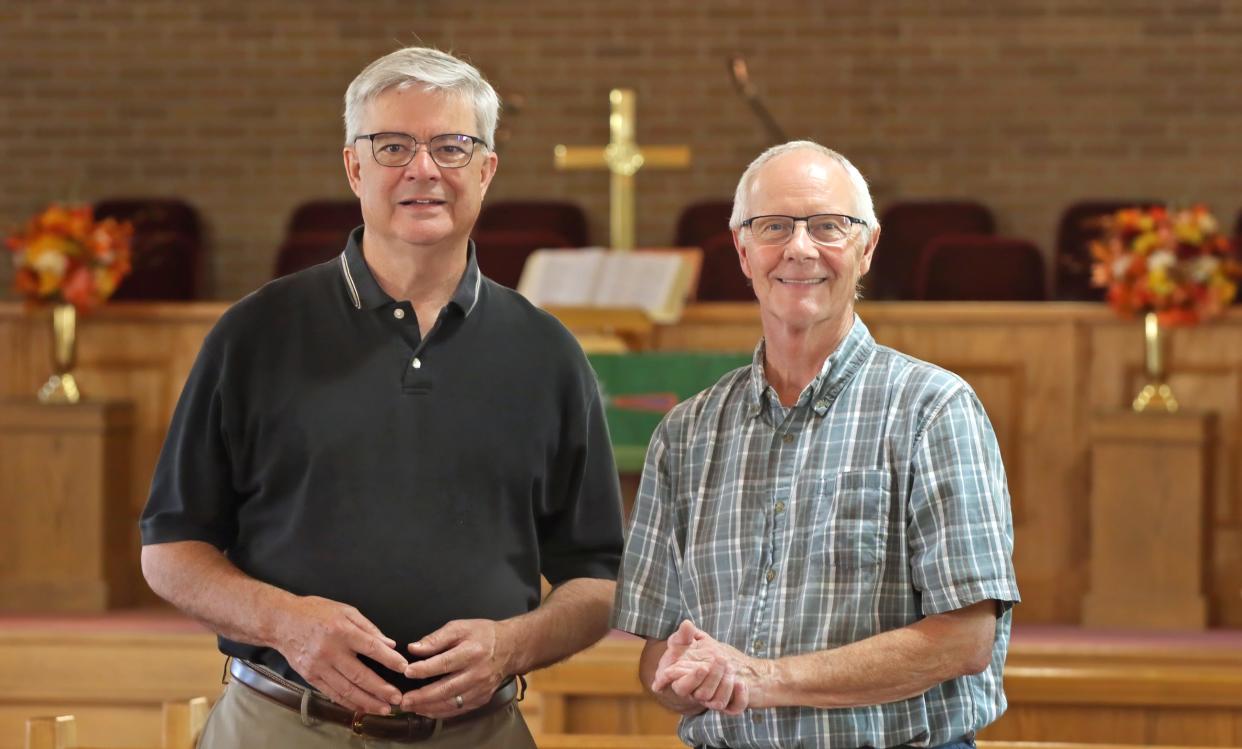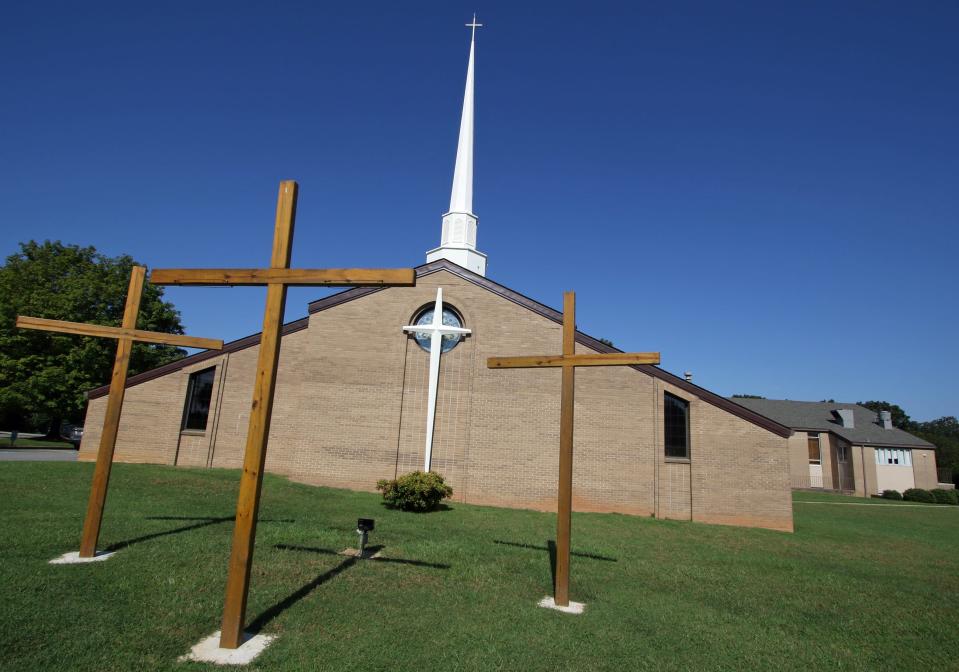Local church leaves United Methodist denomination over conflicting beliefs, gay marriage

On Wednesday nights a handful of worshippers gather at the white-steepled church on Lafayette Street for a fellowship supper. Most of the congregants are elderly, a faithful remnant who have weathered the past year at Lafayette Street Church.
Recently, the church marked a milestone as they celebrated one year separated from the United Methodist Church. The long sloping lawn, interrupted by several wooden crosses and dotted with bright orange pumpkins each fall, borders busy Lafayette Street. The sign in front of the building is consciously missing the United Methodist portion, all logos scrubbed from the property.
The congregation, down to around 35 people, voted last year to leave the United Methodist Church and become non-denominational to head off the possibility of allowing LGBQT clergy to serve the church or to prevent the performance of gay marriages.
Church leaders said that has been a key point, but their decision was also made in an effort to escape heavy handed leadership from the top and a feeling of being neglected. Lay leader and chair of the administration board, Mike Stair, felt the United Methodist Church was scraping the bottom of the barrel when it came time to assign new pastors to their rural congregation.
Stair said they are traditionalists and as such hold onto standard practices that are over 2,000 years old.
“Marriage is between a man and a woman,” Stair said. “We’re not saying LGBTQ people aren’t welcome here, they certainly are, there’s just two things we can’t do for them.”
The church welcomes everyone, in theory.
“It’s not like we’re standing with baseball bats at the door keeping them out,” said Wofford Caughman, current pastor.
He said the church wants to move ahead but doesn't want to rally anyone to a cause or have to defend themselves.Both men said they have friends who are gay, friends who they love and spend time with, but who know where they stand on the issue.
“Our stance is, this is what God says and this is what we believe,” Caughman said. “Love the sinner, hate the sin.”
“It’s not that I’m not able to see your point of view,” Stair said. “It’s that I choose not to.”

Stair said a number of local churches have disaffiliated with the Methodist Church over the past year with Hoey United Methodist the first to do so quickly followed by Lafayette Street a few months later. He said Sharon, Sulfur Springs, Polkville and Lawndale methodists all followed suit.
The process for disaffiliation is implemented through Paragraph 2553 in the UMC Book of Discipline as adopted by the 2019 general conference of the United Methodist Church.
Churches wishing to do so must submit a letter requesting disaffiliation signed by several church leaders, they must make a payment to the United Methodist Church and congregations must have a two third vote to leave.
The disaffiliation agreement is being offered to Methodist churches until the end of 2023, at which point Paragraph 2553 is no longer valid.
Stair said since their church was one of the first to go through the process, they were able to help and guide others.
“The LGBQ issue is a big one right now, but we certainly don’t want to make it the centerpiece of our story,” he said. “The overall flavor of the story is that there is life after the United Methodist Church.”
In 2018, at the United Methodist Church General Conference, leaders rejected the One Church Plan, which would have eased restrictions on LGBTQ clergy and same-sex marriages.
Instead, leaders voted to pass the Traditional Plan, which bans same-sex weddings and LGBTQ clergy.
But Stair said many of the more rural, traditional churches see the writing on the wall and at the next General Conference, scheduled in 2024, they expected that ban to be lifted.
“Many of us in conservative Ssuthern states were surprised,” Stair said.
They felt the larger metro, progressive churches had more sway.
“Most of the churches in the metro district - Charlotte and Raleigh - looked at it progressively and most rural churches looked at it traditionally. It set us up for a schism,” he said.
Stair said the traditional churches felt left out, like they no longer had a voice.
As a delegate for the Catawba Valley district, he heard the vote would be overwhelmingly in favor of progressive views at the next United Methodist General Conference.
“I don’t know if the Lord intervened or what,” Stair said. “But COVID popped up.”
The conference was canceled and wouldn’t be held until 2024.
Traditional churches began appealing their bishops to remain under the Traditional Plan, and it was then that churches were given the option to disaffiliate.
The United Methodist Church has the philosophy of “one church, many places” and owns all the church buildings. If churches were to leave, they would have to leave buildings and cemeteries behind, which left the issue of who would maintain the cemeteries.
Stair said Lafayette Street Church’s building is worth more than $2 million, a sum the small congregation couldn’t afford.
The United Methodist Church then came up with Paragraph 2553 which offered churches a way to disaffiliate and keep their buildings for a lesser fee.
“That was the format that all of us in the county have worked under to disaffiliate,” Stair said.
The church voted on the decision and had the two third majority vote.
Stair said they formed a new nonprofit, showed it was viable, and raised the $140,000 fee required by the United Methodist Church. After raising the money, the church removed all symbols and logos associated with UMC and became an independent denomination of faith.
Strair said they currently have 65 church members. Before disaffiliation, they officially had 301 on the roll, but Stair said that doesn’t accurately capture the numbers since pastor’s rarely purged members who were inactive because they were paid based on how many were on the roll.
In the year since dropping the United Methodist name, Stair said they’ve grown from the low of around 35 members at the time the church voted to leave. He believes the church is now a better match for the community than previously.
The church’s next task was finding a minister who could help them grow and get them through the transition phase.
Stair said one of their prior complaints with the United Methodist Church was the pastors they were given. He said they were sent lay pastors instead of ordained ministers, including a retired barber who was not ordained. They felt they weren’t getting quality candidates.
“We were the last one they thought of when it came to pastor assignment,” he said. “We tearfully saw our own end.”
Lafayette Street Church then hired Caughman, a retired South Carolina Baptist minister, and tasked him with building a church from the ground up.
Caughman said he accepted the assignment because he was seeking a challenge.
He said he and his wife were living in Gaffney, South Carolina, and happened to be driving by Lafayette Street Church at the time church leaders were removing the United Methodist words from the sign.
Stair calls it divine intervention.
When Caughman saw the ad for the position, he applied.
Caughman said he is trained as a transitional pastor, making him a good fit for the temporary position.
Stair said they are looking for a permanent pastor and hope to find a young candidate willing to be a mentee under Caughman and learn the craft and skill from an experienced minister.
Most of the congregation is older, although they are hoping new music, art or projects will attract a younger congregation. Stair said one interesting change that’s occurred since they became nondenominational is attracting a more multiracial congregation. Both Caughman and Stair said in a national trend, nondenominational churches are growing and attracting people of all ages and races, while denominational are losing members.
“Folks want to get away from labels,” Caughman said.
Stair said he doesn’t know if the church will be sustainable, but he believes churches should have the freedom to follow both progressive and traditional scriptures.
This article originally appeared on The Shelby Star: Local church leaves UMC over conflicting beliefs, gay marriage

